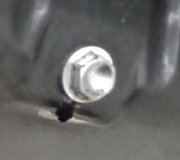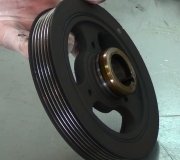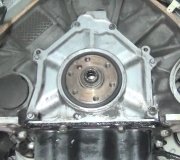You are getting conflicting advice because you are providing confusing details. It only leaks with the engine running. It leaks while pouring in oil and the engine is not running. This should have been handled by a professional a long time ago. Loss of oil is not something to fiddle around with. It will turn serious real quickly, and it sounds like you have already done some engine damage if it is stalling.
These are the kinds of leaks mechanics love because they are real easy to find. Dye is for extremely slow leaks that take hours or days to show up, and the residue spreads around making the source of the leak nearly impossible to find. That is not the case here. Cadieman is right about the oil filter. The gasket from the last one could have stuck in place when the new filter was installed. That is called "double-gasketing" and it happens to all of us sooner or later. The new gasket is held in place by a ridge on the filter. Nothing holds the old gasket in place so it blows out from the oil pressure. The oil will only leak when the engine is running because that is when the oil pump is pushing oil, under pressure, to the filter. There are a lot of passages taking that oil to critical places in the engine. It is the oil running out of those passages that makes it continue running out after you stop the engine. You will lose up to another half quart after the engine is stopped, and it will continue to drip for hours after that.
The only thing you can do is to try turning the oil filter clockwise to see if it is loose. If it is, turn it as tight as you can get it by hand. If it already seems tight, unscrew it counter-clockwise to remove it, then look on the unpainted mounting surface to see if the large square rubber o-ring gasket is in place. If it is, look for a second one sticking to the engine. If you see one on the engine, remove it and throw it away, then put the filter back on.
If the gasket and tightness is not the issue, examine the crimp in the filter housing to see if part of it has separated creating a hole. If it has, you have a problem with the oil pump's pressure relief valve and too much pressure has exploded the filter. You can try a new filter first but chances are the same thing will happen. Even cheap filters are made with enough integrity that this only happens when there is an engine problem, not from being cheap.
If you still have not identified the cause of the leak, tow the car to a mechanic because at this point it is likely to be beyond the scope of most do-it-yourselfers. The filter "adapter" was mentioned and is a possibility. It is really a "fixture" to allow the filter to be attached to the engine. It is rare for them to crack, but it is not unheard of. There could also be a leaking plug at the end of an oil passage. They cap off access holes the manufacturer used to drill passages inside the engine. Usually those are threaded and have sealant on the threads, but in some applications they are pressed-in soft metal plugs. Plugs are typically used where something else will be bolted on over it so it cannot work its way out. One of those plugs could have rusted out.
Look for the highest point you see oil running down the side of the engine. Oil does not run up so if you see it up high, there could be a valve cover gasket leaking or a camshaft seal, but both of those will leak relatively small amounts of oil and there will not be very much leaking after the engine is stopped. That does not match with the ten minutes you originally stated to lose all the oil. Unless a valve cover has a chunk missing or a camshaft seal has blown out, the oil will take over a hundred miles to leak out. The clue is to figure out the highest point you see oil running down and follow that to the source.
Saturday, November 16th, 2019 AT 1:47 PM
(Merged)



